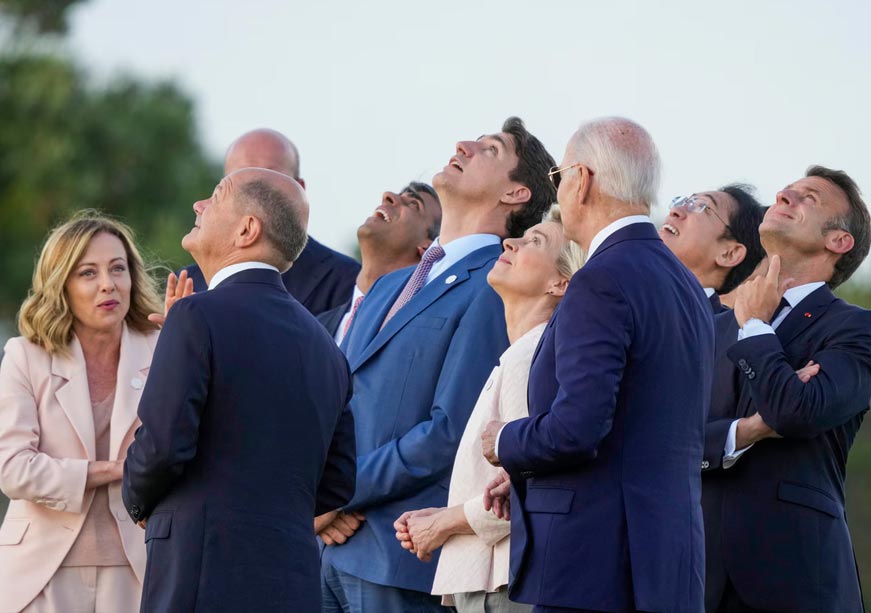The grand convergence at the Apulia G7 Summit in Italy between the western democracies and the Global South was facilitated by the G7’s sensitivity to the systemic risks it faces from the Russia-China dyad. Once seen as the sole shepherd to the global economy, the G7 nations along with the EU gathered under the Italian Presidency for the group’s 50th Summit with an agenda to deepen inter-group coordination against Russia as well as enhance their collective outreach to Africa, where China is seen as a dominant investor through its Belt and Road Initiative. Guided by the G7’s own stratagem, the Summit’s outreach session saw an invitee list dominated by the Global South with leadership presence from Brazil, Argentina, the UAE, Turkey, Jordan, Algeria, Kenya, Tunisia, Mauritania and India.
Africa taking the centre stage at the Indian G20 in 2023 and then at the very next G7 Summit concluded recently, signals two dynamics at play.
India’s presence at Apulia affirmed the nation’s increasing heft within the broader G-summitry. The G7’s focus on Africa follows the inclusion of the African Union (AU) in the G20 as a permanent member at the Delhi Summit. Africa taking the centre stage at the Indian G20 in 2023 and then at the very next G7 Summit concluded recently, signals two dynamics at play.
There is a unified global consciousness that there is no progress without Africa, an integral part of the Global South. Second, this G7 confirmed that the voice raised by India for the Global South, during its G20 Presidency last year by facilitating the inclusion of the AU, is instrumental in steering the global multilateral agenda and is bulkier than mere rhetoric.
However, the focus on Africa is also derivative from the fact that Africa remains central to curbing the climate crisis and economically driven migration into Europe, as well as a crucial avenue for Europe to address its own energy insecurities that have a root in the Russia- Ukraine war. Founded on this logic, G7 launched the Energy for Growth in Africa initiative to invest in sustainable industrial and infrastructural development in African countries. To tackle the issue of migration, the group launched the G7 coalition to prevent and counter the smuggling of migrants. G7 also declared that its flagship infrastructure financing initiative, Partnership for Global Infrastructure and Investment (PGII), will particularly focus on G7’s outreach to Africa by facilitating investments in energy and climate-friendly infrastructure. PGII is touted as a Western competitor to China’s BRI. The G7 communiqué also targeted Russia by highlighting that “sustainable development and democracy are mutually reinforcing” but the Kremlin-backed Wagner Group and other emerging Russia-backed forces are having a destabilising impact on building democracy in Africa.
G7 also declared that its flagship infrastructure financing initiative, Partnership for Global Infrastructure and Investment (PGII), will particularly focus on G7’s outreach to Africa by facilitating investments in energy and climate-friendly infrastructure.
The final communiqué released by the G7 leaders was broadly condemnatory towards China, be it on the issue of Chinese support to Russia by transfer of dual-use materials that become inputs for Russia’s defence sector or on China’s recent encirclement of Taiwan.
The Summit also saw the group launch a Semiconductors G7 Point of Contact Group, which is linked to the fears of a Taiwan contingency-induced disruption of the supply chain in semiconductor trade. G7 showed no reservation in mentioning Chinese human rights violations in Tibet and in Xinjiang, and also opposed “China’s dangerous use of coast guard and maritime militia in the South China Sea”. Accordingly, consistent invites to India from a G7 which remains locked in a strained relationship with China suggests that the Western democracies find India as an interoperable partner in the Indo-Pacific. Moreover, Prime Minister Modi’s bilateral meetings with France, Italy, Japan and the UK at Apulia were also an apparent signal to China.
The Summit also projected a unified West against the Russian aggression in Ukraine as the G7 launched the Extraordinary Revenue Acceleration (ERA) loans whereby Ukraine will be provided with $50 billion by the end of 2024 to finance its military budget and reconstruction needs. This loan is to be serviced by interest revenues generated from Russian sovereign assets seized by the European Union and other G7 partners. Though the exact response from the Kremlin will be visible in the upcoming days, a Russian Yasen class nuclear submarine was seen trailing along the west coast of Ireland to Scotland the very next day of the G7 summit, seen as apparent signalling directed towards Europe.
While the G7 will remain crucial for the global governance architecture at large, the policy implications of a change in administration at Washington as well as political instability generated by recent European Parliament elections will raise valid concerns on the continuity of policies that came out at Apulia.
This commentary originally appeared in Hindustan Times.
The views expressed above belong to the author(s). ORF research and analyses now available on Telegram! Click here to access our curated content — blogs, longforms and interviews.




 PREV
PREV


.png)
.png)